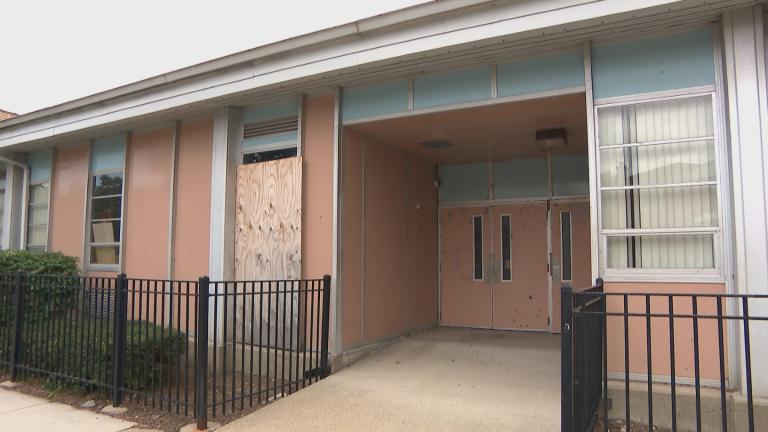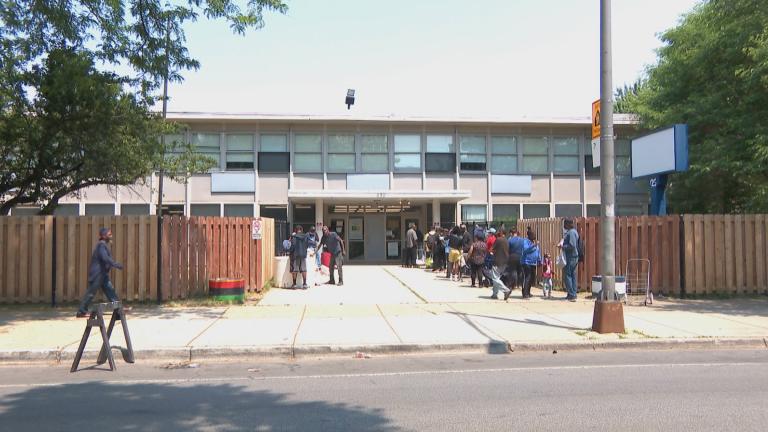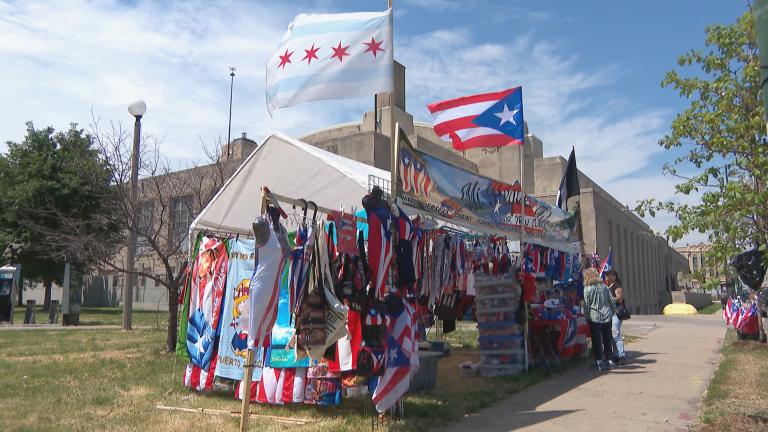Across from McKinley Park’s namesake park, there’s a school, neighborhood homes and planned affordable housing.
There’s also an asphalt facility.
MAT Asphalt moved into the neighborhood in 2017 and since its opening, environmentalists have been pushing for its removal.
Alfredo Romo, organizer and executive director of Neighbors for Environmental Justice, said one of their main concerns has been the pollution caused by the making of asphalt and the impact it has on the air quality in the community.
“This company cannot coexist with our environment,” Romo said. “We’re in this beautiful park that becomes a community center. We have seven schools, five daycares in the community. So, it’s very hard for us to walk away from this issue … these toxic elements that we are being impacted by.”
Romo said there have also been complaints about the odors coming out of the facility.
The organization has gone as far as monitoring the air quality.
In the long run, Romo said asphalt plants put people’s health at risk, and at this point, they are pushing the city to do a better job overseeing these facilities.
“These people are low income,” Romo said. “There’s also low disinvestment, and less education, so it makes it hard for these valuable people to once again organize and fight back. So, the system knows that the operators know that. The developers know that and that’s why we are targeted.”
Interactive map: More from our community reporting series
Now, the plant’s owner, Micheal Tadin Jr., is set to purchase another property just about a mile away.
The state announced it will enter into exclusive negotiations with MAT Limited Partnership to take over the Damen Silos property.
The 23-acre property located along the Chicago River has been vacant for years.
Joseph Haughey runs the daily operations at MAT Asphalt and said the first step is to remediate the site.
“The very first focus is to remediate it,” Haughey explained. “It’s a pretty unsightly area with graffiti and problems with the soil and that is going to be first and foremost.”
In a statement, Tadin Jr. of MAT Limited Partnership shared in part: “Just as we have done with all our businesses over the years, MAT is committed to building a state-of-the-art headquarters on the Damen Silos site."
Environmental groups strongly oppose the sale and are asking the state to give McKinley Park residents an opportunity to express their concerns.
Environmental activists like Romo believe the sale is yet another example of the city “choosing money over people.”
MAT Asphalt’s Haughey said the plant has lower emissions than other asphalt plants in the area, and that they closely follow health protocols.
“When it comes to pollution control, you can’t do better than this asphalt,” Haughey said. “We went above and beyond when we were making the purchase knowing we were in the city of Chicago, so we went that extra mile … we paved every single road way and we went electric.”
Phillip Boda, a professor at the University of Illinois at Chicago, focuses on environmental justice, specifically on educating Black and Brown communities.
Boda, along with a team of scientists, recently released a “dashboard” that tracks pollution emitters across Chicago. Currently, 60% of Chicago’s asphalt plants are concentrated on Chicago’s Southwest Side, leading to what they say is an overburdened community.
“A lot of asphalt plants exist on the Southwest Side as well as their storage facilities,” Boda explained. “We are completely surrounded right here — from the north side to the west side and to the southside — completely surrounded by asphalt plants.”
His work further focuses on showcasing how these facilities affect the most vulnerable: children. He is now calling on the city to bring back the environmental department.
“When it was abolished, they disrupted all accountability and benchmarks,” Boda said.
Boda said his department has applied for a grant to build an environmental hub at UIC aimed at further educating people on community health.
Education and Culture in McKinley Park
Meanwhile, other local organizations are working to help educate the community through instruction in the English language.
The Aquinas Literacy Center has been helping immigrants learn English through tutoring since 1996.
The center was recently awarded a $1.5 million investment by the Adrian Dominican Sisters to “build and create a more resilient immigrant community” in McKinley Park starting in January.
“It’s a multi-faceted plan bringing in education, employment, working with two community organizers who speak the languages of this community, both Chinese and Spanish,” said Alison Altmeyer, executive director at the center. “It’s the idea of working together to develop this community…to teach how to advocate for yourself.”
Video: Watch our full interview with Alison Altmeyer
The Mexican Folkloric Dance Company of Chicago has also shared a long-time presence, not only in McKinley Park, but city-wide.
The dance company has been around since 1982 and features over 46 styles of Mexican traditional dances — from states like Jalisco, Veracruz and Chiapas.
Executive Director Henry Roa said COVID led to many canceled performances, but grants have kept them afloat.
“It hurt us, it shut us down,” Roa said. “We lost everything. In 2020, all of our performances were canceled. We had no income other than the Illinois Arts Council and the Chicago Department of Cultural Affairs … we’re trying to publicize ourselves, promote ourselves.”
The dance company will be performing at the McKinley Park Field House starting at 2 p.m. on Saturday. It’ll be the first post-COVID performance of the childrens dancing group.
Video: Watch our full interview with Henry Roa.
“Chicago Tonight” is expanding its community reporting. We’re hitting the streets to speak with your neighbors, local businesses, agencies and leaders about COVID-19, the economy, racial justice, education and more. See where we’ve been and what we’ve learned by using the map below. Or select a community using the drop-down menu. Points in red represent our series COVID-19 Across Chicago; blue marks our series “Chicago Tonight” in Your Neighborhood.Community Reporting Series








